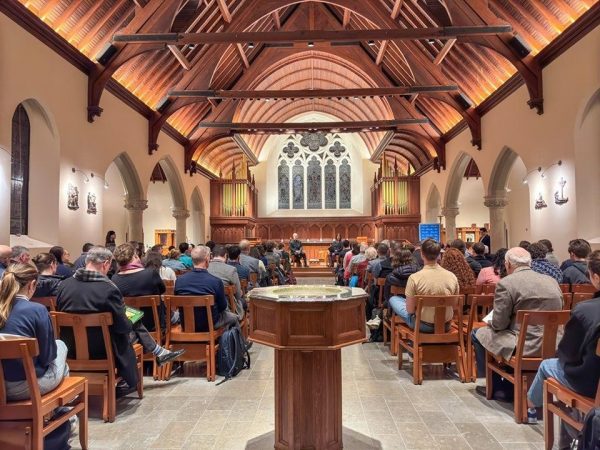A Jesuit priest and longtime advocate for LGBTQ+ Catholics outlined strategies to help expand outreach to LGBTQ+ people and reflected on progress at the highest levels of church leadership at a Feb. 4 event in Dahlgren Chapel.
The talk, titled “Building Bridges: The LGBTQ+ Community and the Catholic Church,” featured Fr. James Martin, S.J. — also a member of Georgetown University’s Board of Directors — and was moderated by Kim Daniels, the director of Georgetown’s Initiative on Catholic Social Thought and Public Life, which seeks to create dialogue on national and global issues impacting the Catholic Church. Martin’s 2017 book, “Building a Bridge,” in which he outlined a model for how he believed the Catholic Church should relate to the LGBTQ+ community, inspired the name of the talk.
Martin said Pope Francis’ work to normalize acceptance of LGBTQ+ Catholics displays a marked divergence from his predecessors.
“He’s the first pope ever to use the word ‘gay.’ His five most famous words in English are, ‘Who am I to judge?’” Martin said at the event. “He appointed the first openly gay man to a Vatican commission, Juan Carlos Cruz.”
“He meets regularly with transgender Catholics who are brought to him every month, right? He has talked about parents not kicking out LGBTQ people,” he added.

Martin said that although some may argue that the Pope has not gone far enough in his outreach efforts, changing prevailing attitudes within the church is a slow but necessary process.
“In parts of the world like sub-Saharan Africa, Eastern Europe, Latin America, the subcontinent, it’s a big deal, and there was a lot of pushback,” Martin said. “So that’s one thing we have to keep in mind for all of us who are Catholics, that it is a universal church, and when we push a little bit here, it seems like pushing a lot over there.”
Martin also discussed his October 2023 experience as a representative at the Synod on Synodality, a multiyear process Pope Francis initiated that brought together religious leaders and laypeople alike in Rome to engage in dialogue on issues facing the Catholic Church. Though the gathering marked the 16th time a pope has called such a synod, it was the first iteration at which women were allowed to vote on resolutions.
Martin said the church is slowly becoming more progressive on including women in official church roles, recounting a conversation with a bishop at the synod.
“One bishop said to me, ‘Do you see what’s happening?’ — Father James, is what they called me. I said, ‘No, what?’ ‘We’re in the Vatican. We’re at a meeting of the synod of the bishops. The Pope is with us, and a woman is running the meeting,’” Martin said. “So it’s just these kinds of steps forward that made one bishop say to me, ‘We can’t go back. We can’t go back.’”
Mary Greer, 65, decided to attend the event after she saw a poster for it while running through campus. Greer said she had previously encountered Martin’s advocacy and was drawn to his inclusive view of Catholicism.
“I always say I’m a conflicted Catholic, trying to find a connection to what I feel like will always be my faith, as a gay person and someone that struggles with the institutional church,” Greer told The Hoya. “But just as recently as yesterday, I think he published on his social media a statement about transgender people, and I just felt like it was just so loving and Christ-like. I was so excited to come and hear him speak — I didn’t expect to be as nourished spiritually as I was, and I am so grateful for that.”
CC Mesa (SFS ’26), a member of a queer Catholic faith community at Georgetown and an attendee at the event, said she was pleasantly surprised by Martin’s willingness to discuss his encounters with overt homophobia among church leaders.
“I feel like often when we get into these conversations and these writings about LGBTQ+ people in the Catholic Church, it tends to focus on the positive a lot, which is needed. The Lord knows we need hope at this current and present moment in time, right?” Mesa told The Hoya.
“But touching on the anti-LGBTQ comments, saying that exists and that is part of the struggle and that ‘You can get blue in the face arguing against these people, but until they are confronted with the very real existence and the very real love of the LGBTQ community, they can’t change,’ that surprised me in a very positive way,” she added.
Reflecting on the event, Martin said he was gratified by the turnout and engagement, especially from Georgetown students.
“What stood out for me was the number of students that were there, and how interested they were about living out their faith lives and being a welcoming community,” Martin told The Hoya. “I found that really inspiring.”